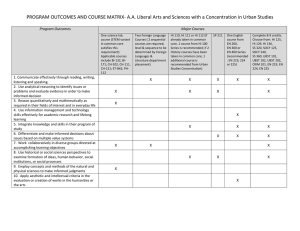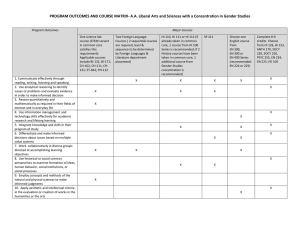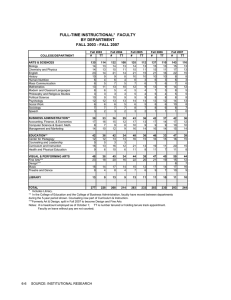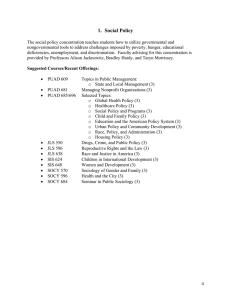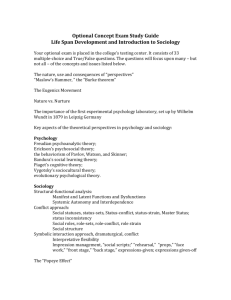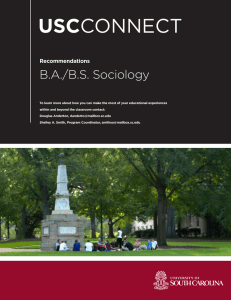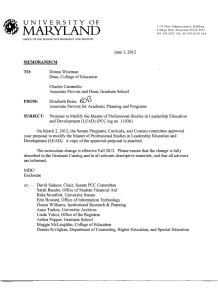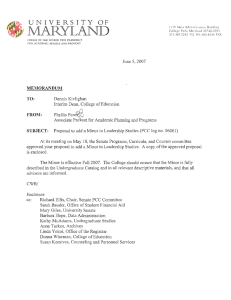@ MA-RY-LAI5J-D
advertisement
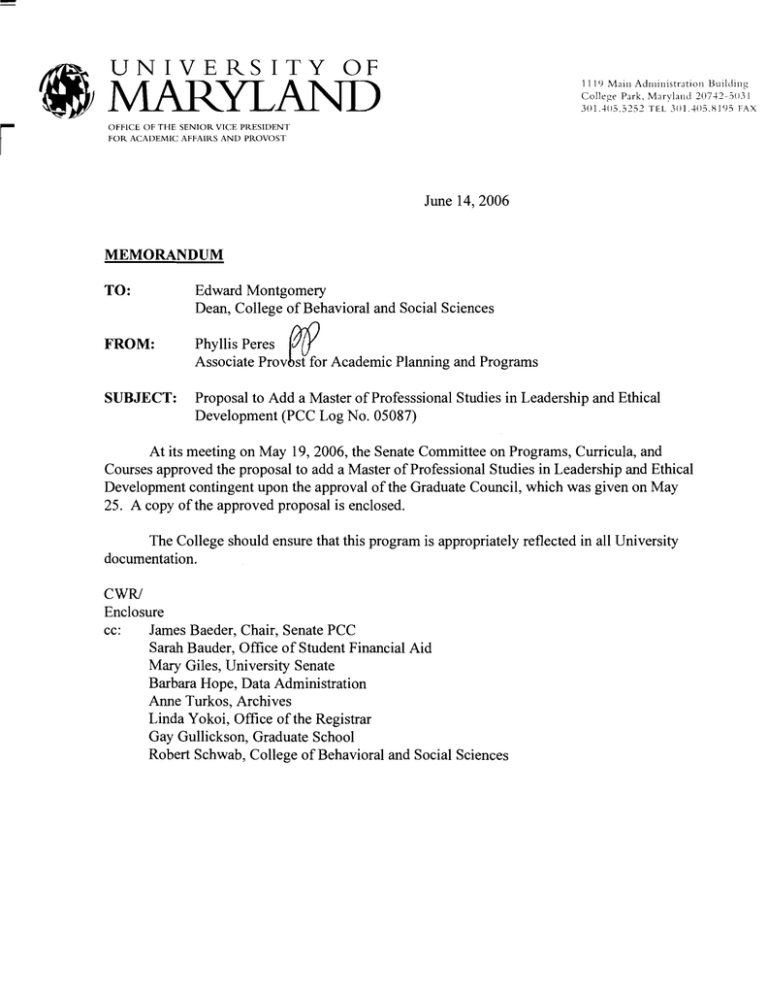
UNIVERSITY OF @ MA-RY-LAI5J-D r 1 1 10 Main A d m i n i ~ t r ~ l t i oBuildins tl College P ~ r kMaryland , 20712031 301.-10J.i252 T E L 301.10.3.81')5 FAX OFFICE O F T H E S E N I O R V I C E PRESIDENT F O R ACAIIEMIC: AFFAIKS A N D PROVOST June 14,2006 MEMORANDUM TO: Edward Montgomery Dean, College of Behavioral and Social Sciences FROM: Phyllis Peres Associate Prov st for Academic Planning and Programs SUBJECT: Proposal to Add a Master of Professsional Studies in Leadership and Ethical Development (PCC Log No. 05087) I?? At its meeting on May 19, 2006, the Senate Committee on Programs, Curricula, and Courses approved the proposal to add a Master of Professional Studies in Leadership and Ethical Development contingent upon the approval of the Graduate Council, which was given on May 25. A copy of the approved proposal is enclosed. The College should ensure that this program is appropriately reflected in all University documentation. CWRI Enclosure cc: James Baeder, Chair, Senate PCC Sarah Bauder, Office of Student Financial Aid Mary Giles, University Senate Barbara Hope, Data Administration Anne Turkos, Archives Linda Yokoi, Office of the Registrar Gay Gullickson, Graduate School Robert Schwab, College of Behavioral and Social Sciences THE UNIVERSITY OF MARYLAND, COLLEGE PARK PROGRAMICURRICULUMPROPOSAL r DIRECTIONS: Provide one form with original approval signatures in lines 1 - 4 for each proposed action. Keep this form to one page in length. Early consultation with the Ofice of the Associate Provost for Academic Planning & Programs is strongly recommended if there are questions or concerns, particularly with new programs. Please submit the signed form to Claudia Rector, Office of the Associate Provost for Academic Planning and Programs, 1119 Main Administration Building, Campus. Please email the rest of the proposal as an MSWord attachment to pcc-submissionsf2umd.edu. DATE SUBMITTED-51 10106- PCC LOG NO. 05087.. COLLEGEISCHOOL BSOS DEPARTNIENTPROGRAM OIEP PROPOSED ACTION ( A separateform for each) A D D X DELETE CHANGE DESCRIPTION (Provide a succinct account ofthe proposed action. Details should be provided in an attachment. Provide old and new sample programsfor curriculum changes.). This proposal is to establish a Master's of Professional Studies in Leadership and Ethical Development. This program consists of courses in Sociology, Psychology, and Education Policy and Leadership. The program will be administered by the Office of International and Executive Programs in the College of Behavioral and Social Sciences. This program was developed in response to competitive procurement from the United States Naval Academy (USNA). This proposal was selected in competition with Johns Hopkins, George Washington, Georgetown, and a combined effort of the Naval Postgraduate University and the School of Public Policy of the University of Maryland. The program will be offered to those officers at the USNA who manage the brigade of midshipmen. It is a 45 credit program to be completed in a twelve month period of study. Classes will be taught on campus and at the USNA. Please see attached proposal that was selected for award by the USNA. The Program Director is Charles Wellford (BSOS). The other members of the oversight committee are David Segal (SOCY), Gay Gullickson (Graduate School), Donnie Homer (USNA), and Darlene Iskra (Administrative Manager). In the attached proposal there are two courses are that are not yet develop (a course on ethics and a course on the Naval Academy). These are not offered until Spring of 2007 and will be submitted for approval before then. Any other changes in courses will be submitted through the PCC process. JUSTIFICATION/REASONS/RESOURCES(Briefly explain the reason for the proposed action. IdentiJL the source of new resources that may be required. Details should be provided in an attachment.) Resources for this program are supplied by contract with the US Navy and are consistent with the guidelines for MPS programs. Prior to submitting this proposal to the US Navy, approval was obtained from the Dean of BSOS, all participating departments, and the Office of the Provost. The budget approved by the USNA is attached. DATE APPROVAL SIGNATURES 1. Department Committee Chair 2. Department Chair 3. College/School PCC Chair 4. Dean - -&% A 5. Dean of the Graduate School (if required) / O 6 1 810 b I 3 5 / 1 4 /db 6. Chair, Senate PCC 7. Chair of Senate s-//z v 8. Vice President for Academic Affairs & Provost I - VPAAP 8-05 PROGRAM OVERVIEW: The Leadership Education and Development (LEAD) Program was designed by the Naval Postgraduate School and the United States Naval Academy to prepare officers for the responsibilities of Company Office at the Academy and as leaders throughout their careers. In the LEAD Program, Company Officers will spend twelve months as full time students. Following completion of the Program, they then spend two years at the Academy where they lead and mentor a company of approximately 150 shipmen. The U.S. Military Academy at West Point and the U.S. Air Force Academy offer parallel programs. The Naval Postgraduate School has administered the program since its inception. In Fall 2005, the Navy asked Johns Hopkins, Georgetown University, George Washington University, the Naval Postgraduate School, and the University of Maryland to submit proposals to administer LEAD for five years beginning June 2006. On May 3, 2006, Maryland was informed by the Navy that its proposal for an interdisciplinary Masters of Professional Studies had been selected. The proposal represents a joint effort by programs in three departments with the lead taken by the College of Behavioral and Social Sciences (BSOS). BSOS, then, proposes the Master of Professional Studies (MPS) in Leadership Education and Development (LEAD) as a one-year academic program with 45 required credits and an optional 6 credits of electives. The interdisciplinary MPS includes courses from the three collaborative LEAD programs: the Department of Counseling and Personnel Services (EDCP), the program in Industrial and Organizational Psychology in the Department of Psychology (PSYC), and the Program in Military Sociology in the Department of Sociology (MILS). These academic units, with administrative and logistical support from the Office of International and Executive Programs (OIEP), have combined to propose a Professional Studies for the specific cohorts covered through the Navy contract. In the US News and World Report rankings, the Department of Counseling and Personnel Services (EDCP) is the top-ranked program of its type in the United States and has been for the last six years. With a faculty of 19, it offers a comprehensive educational and research program in counselor education and counseling psychology, leadership, and development. Among its faculty are seven fellows of the American Psychological Association and two fellows in major British psychological associations. Currently three of the most prestigious journals in the field are edited by faculty in this program. EDCP has had numerous military officers in its program and works closely with many organizations on issues related to leadership development and organizational enhancements. The EDCP and the Student Affairs programs at the University of Maryland are national leaders in undergraduate leadership education and development programs. The University of Maryland houses the National Clearinghouse on Leadership Programs and the Leadership Insights and Applications Monographs series. The program in Industrial and Organizational Psychology has been ranked number one in its field for the past twenty years. The Ph.D. program in Industrial and Organizational (I/O) Psychology is based on four principles: (1) both students and faculty learn best in an atmosphere characterized by diversity of interests, mutual respect, informality, and hard work; (2) students are responsible for formulating, within broad guidelines, the flavor of their own individual programs; (3) both breadth and depth of training in psychology is general, and I/O psychology in particular, is necessary to understanding the complexity of the developed and established theories and research in I/O Psychology; and (4) research that is both problem-oriented ("practical") and theoretically meaningful is a major goal of our program. These characteristics are consistent with the goals of LEAD. The Program in Military Sociology in the Department of Sociology at the University of Maryland, with its associated Center for Research on Military Organization, is the premier academic teaching and research institution in the nation with regard to social science analysis of the military. UMCP has been conducting graduate education in the field for half a century, and the Center was established as a Center of Excellence in Military Sociology in 1995, with the dual missions of conducting cutting edge research, and educating the successor generations of soldierscholars and civilian analysts concerned with the military. Of over thirty faculty members who have taught sociology at West Point since the field was introduced there, the plurality (nine) did their graduate study at Maryland. Maryland is followed by Stanford, Chicago, and Northwestern. Currently, the senior sociologists on the regular faculties of all three academies have Ph.D.s from the University of Maryland. Maryland has developed a very successful model for the education of military officers selected to teach at the academies based upon substantive education, teaching apprenticeships, collaboration with faculty, and extensive mentoring through personal contact and professional development seminars that we believe can be adapted readily to the education of future Company Officers. Lead Faculty: We will involve the leading faculty in all three departments in our LEAD program. Here we offer brief biographical sketches of the four faculty who will play key roles in our program: David Segal, Mady Segal, Dennis Kivlighan, and Paul Hanges. These faculty will provide primary academic oversight for the MPS in Leadership Education and Development. David R. Segal is Distinguished Scholar-Teacher, Professor of Sociology, and Director of the Center for Research on Military Organization Mady Wechsler Segal is Professor of Sociology at the University of Maryland and Associate Director of the Center for Research on Military Organization. Dennis M. Kivlighan, Jr., Ph.D. is Professor and Chair of the Department of Counseling and Personnel Services at the University of Maryland. Dr. Kivlighan’s content expertise is in group counseling and group dynamics Paul Hanges is Professor of Psychology and Director of the Industrial and Organizational Psychology program at the University of Maryland. He is a Fellow of the American Psychological Association and of the Society for Industrial and Organizational Psychology. PROGRAM THEMES AND LEARNING OUTCOMES OBJECTIVES: The LEAD MPS is built around the following seven fundamental curricular themes: (1) leadership theory and application, (2) group and organizational dynamics, (3) counseling and mentoring skills and techniques, (4) student development theory and applications (cognitive, affective and moral development), (5) college teaching and curriculum development, (6) military sociology, and (7) integration and application contextualized in the navy environment. The following represent the associated learning outcomes objectives: THINKING CRITICALLY All courses in the proposed curriculum will require active participation of the students. The courses while imparting substantial amounts of material will require the student to analyze and integrate material within and across courses and to develop the ability to critically analyze the material presented. In addition, all courses are being modified slightly to relate them to issues that are most prominent in the USNA and to require students to apply their knowledge to their future position at the USNA. THINKING ANALYTICALLY Underlying all of the proposed courses is the emphasis on the enhancement of the student’s ability to analyze material and issues within the framework of the behavioral and social sciences as they apply in a military organization. The abilities to define a problem, marshal and analyze relevant literature, acquire and analyze relevant data, and reach conclusions that are data-based, are central to all of the courses. The final seminar (BSOS 699C) will enhance these skills using the case method. The seminar will require students to apply all that they have learned to real-life problems that they will encounter as Company Officers. ROLE MODELING This objective is met through a combination of courses and experiences facilitated by the program. EDCP 789D, SOCY 699E, and PSYC 603 provide an interdisciplinary understanding of leadership and motivation, motivational techniques, and the application of leadership and motivational theories and concepts. The materials in these courses are integrated to provide a comprehensive and coordinated understanding of the elements of this objective. In addition, during seminars (BSOS 699A-C) in three of the four terms of study, discussions and invited speakers will consider the application of these ideas in the setting of the Naval Academy as well as provide interaction with real-world users of this body of knowledge. ENHANCING INDIVIDUAL AND TEAM PERFORMANCE This objective is met through a combination of courses and experiences facilitated by the program. Courses in EDCP (618 and 775), Sociology (652 and 699E) and Psychology (603) provide an interdisciplinary understanding of appraisal techniques, counseling techniques, team development, and the development of plans for individuals and teams. Counseling techniques are also taught in the EDCP courses, and all of the courses provide the theoretical foundations for character development. A special course will be developed to address the objective of understanding and applying ethical theory and military ethics. We propose to develop this course in consultation with the sponsor. All of this will be integrated in the seminar BSOS 699C using case studies during the final semester of the program. ROLE MODELING AND MENTORING In EDCP 618 and 699 the students will acquire knowledge of the techniques of role modeling and mentoring and apply them in a teaching environment. The first course (618) provides the foundation of theory and skills-based practice, while the second (699) will involve the students in teaching an undergraduate course in leadership. The teaching will be done with the supervision and assistance of a regular member of the teaching faculty. In this setting the students will be able to learn how to apply their mentoring skills in a higher education environment. Finally, in each of the seminars (BSOS 699A-C) there will be presentations by effective mentors and discussion of mentoring in a military environment. PERSONAL DEVELOPMENT In all courses students will be required to develop their writing and oral communication skills. In the seminar (BSOS 699A-C) they will be required to create and make presentations using the latest presentation technologies. Effective time management is addressed in the seminar and in Psychology 603. The bulk of this objective will be covered in substantive courses in Sociology (652, 654, 664, 699E, and 699N). These courses cover current events as they impact the military and broader society, what effect these have on the Naval profession, and how the USNA and its students are shaped by such developments. NDIVIDUAL, TEAM AND ORGANIZATIONAL DEVELOPMENT In several courses (Psychology 603, and Sociology 652, 654 and 664) and in the seminar (BSOS 699A-C) the theory and practice of individual, team and organizational development will be covered. These courses cover the general theory and the special application of these theories in the military. Students will be able to apply these ideas and techniques during seminar discussions and in cases studies during the final semester of the program. UNDERSTANDING THE EDUCATIONAL PROCESS IN AN UNDERGRADUATE SETTING As noted earlier, our program will give students extensive training in undergraduate teaching techniques and then have them apply what they have learned by co-teaching an undergraduate leadership course (EDCP 317) under supervision. After completing this sequence and the other EDCP courses, the students will be able to design, deliver and assess leadership courses at the USNA. . PROGRAM OF STUDY The proposed program of study is summarized in Table 1. It includes 15 required courses for a total of 45 credits. COURSE DESCRIPTIONS: Course Descriptions Master of Professional Studies in Leadership Education and Development LEAD Seminars (BSOS 699 A-C) The LEAD seminars will focus on the integration of course concepts and their application to the Navy environment. To facilitate this, there will be in class discussion as well as invited guest speakers to discuss such topics as role modeling, leadership, motivation, motivational techniques, application of leadership theories and concepts, and mentoring in a military environment. BSOS 699A This seminar, the first in a series for the Leadership Education and Development (LEAD) Program, will be conducted in conjunction with EDCP 618 (Counseling Skills) and EDCP 771 (Theories of College Student Development). It will also provide a fundamental foundation in the social sciences through a series of lectures and guest speakers from each of the major areas in the College of Behavioral and Social Sciences (anthropology, criminology, economics, environmental science, geography, government and politics, hearing and speech sciences, survey methodology, psychology and sociology). BSOS 699B This is the second in a series of seminars for the Leadership Education and Development (LEAD) Program. It will be conducted in conjunction with EDCP 789D (Student Leadership Development) and EDCP 775 (Facilitating Student Learning in Higher Education). The seminar will discuss and integrate theories and concepts from these two classes and apply them to leadership development in a Navy setting. There will also be outside guest speakers and possible field trips to key agencies in the Washington D.C. metro area, such as the Pentagon, war memorials, Brookings Institution, Center for Strategic and International Studies, and the National Defense University. BSOS 699C This seminar is the last in a series of seminars for the Leadership Education and Development (LEAD) Program. Held at the U.S. Naval Academy in Annapolis, this seminar will use a case study methodology to discuss and roleplay real-life problems students will encounter as company officers. Combining the concepts and knowledge they have gained through the coursework, the seminar will help them to think analytically, applying the theory and practice of individual, team, and organizational development to enhance individual and team performance. BSOS 699X Ethics Course The purpose of this course is to examine classical views of moral and ethical reasoning in the context of one's serving as a Company Officer at the Academy. The intent is to expose students to a wide range of scholarly opinions regarding moral and ethical thought. Students will then apply principles, ideas, and fundamental conceptions to their future role as Company Officers in the Brigade of Midshipmen. Contemporary articles promoting moral integrity, reasoning, and the development of ethical leadership are emphasized. The course relies heavily on case studies. Students will assess situations, diagnose issues, design and apply interventions, and assess intervention results. EDCP 618 Counseling Skills Development and utilization of counseling skills. Most class meetings will be divided between discussion of the weekly topic and participation in experiential activities such as role playing and small group practices. Students in this class will learn to: • Use exploration skills, such as open questioning and reflection of feeling • Use insight stage skills, such as interpretation and self-disclosure • Use action stage skills, such as information-guidance and direct guidance • Develop an appreciation for ethics in counseling • Develop an awareness of multicultural issues in counseling EDCP 789 Practicum in Teaching Leadership The purpose of this course is to encourage students to carefully analyze their responsibilities in the context of leadership for the common good and for purposeful change. Students will come to understand leadership for the concept of relational leadership and how it differs from traditional leadership theories. The course includes the study of leadership as well as the application of leadership theories, concepts, and skills. Students will also develop their own leadership potential through the completion of personal and leadership self-assessments, values exploration, and leadership skill practice through course activities. Specific course objectives are as follows: • Increase self-awareness through the exploration of values, beliefs, culture, and identity. • Learn the basis or group roles, dynamics, and decision-making in order to function constructively in group settings. • Understand the nature of coalitions, communities, and systems. • Appreciate the relationship between ethics and leadership • Discover the complexities of leadership and the multi-disciplinary nature of leadership studies • Compare and contrast tradition l and emergent paradigms of leadership • Apply critical thinking to leadership theories and practices • Understand gender and cultural differences on leadership • Build an awareness of leadership issues facing our communities and society EDCP 771 Developing Theories of College Students The goals for this course are: • Develop a deeper understanding of the nature of theory, how it is created, and how it is modified • Learn about the history and the contexts in which developmental theories applying to college students have evolved • Study and understand particular dimensions (e.g., race, social class) of identity development and how they are part of a student’s overall development • Study and understand the psychosocial and cognitive development of college students, both the theoretical and research bases, and how these theories and models intersect and interact with other aspects of identity development • Develop a deeper understanding of the broad range of college students • Learn how environments can enhance or retard student development • Gain skill and comfort with applying developmental theories and constructs to counseling students. • Develop new and transformative theories, models, and ideas about how college students develop psychosocially, cognitively, and in terms of their own identities. EDCP 775 Facilitating Student Learning in Higher Education The primary goal of this course is for students to develop an understanding of the teaching/learning process and how it can be facilitated. Specific objectives are as follows: • To understand major theories of student and adult development and to develop an understanding of the interaction of developmental issues with the process ot teaching and learning • To gain an understanding of the unique characteristics and development of various populations of students and to relate this understanding to the teaching/learning process • To be able to assess both student learning and curriculum characteristics with respect to stages of intellectual development, learning styles, identity issues, and skill/ability issues • To develop insight into the process of instruction as it relates to one’s functioning in a classroom as well as to one’s own specific professional roles. • To be able to design and implement developmental learning environments to be able to assess and evaluate the effectiveness if a developmental design/learning process, and faculty consultation • To conceptualize, design, and frame curricular experiences in terms of student learning. EDCP 789D Advanced Topics in Counseling and Personnel Services This course explores the development of leadership among college students. The course is designed to provide fundamental grounding in four primary topics: (1) the study of leadership theory and research notably the evolution of leadership theory to the present emergent paradigm emphasizing collaboration, character, and empowering group members, (2) a focus on how leadership is learned including strategies for developing leadership among college students, (3) the pedagogy of how leadership programs teach leadership, (4) multicultural and dimensions of leadership development for diverse students, and (5) the current national scene in leadership associations/programs/resources. PSYC 603 Industrial and Organizational Psychology This course is designed to provide students with an introduction Industrial/Organizational Psychology. The course will cover the basics of the field as well as some of the newer topics on the horizon. Specific topics include: the history of IO, motivation, attitudes, justice, leadership, teams, negotiation, diversity, organizational climate and culture, person-organization fit, job analysis and performance appraisal, selection, and training. SOCY 652 Women in the Military Students in this course analyze past, present, and future trends in women’s roles in the military using relevant theory and empirical research from the fields of sociology, psychology, history, political science, and demography. A cross-national perspective is employed. Students learn how women’s roles in the armed forces (as well as in other social and occupational contexts) are a function of the interplay between cultural forces (values, norms, beliefs, attitudes) and other factors such as technological change, demographic patters, occupational structures, and considerations of efficiency and rationality. Policy questions are addressed in the course, including the arguments and evidence that serve to support different positions on the issues. These questions include: Should women be allowed to volunteer for combat roles? Should women be conscripted if men are? Should women be required to serve in combat on the same basis as men? What should we do about people who are parents? Should the two genders be treated the same or differently with regard to parental status? SOCY 654 Military Families Work and family are the two most important life domains for most people. While both have been traditional areas of sociological study, they were separate areas of research. Growing emphasis is being place on the relationship between these two major social institutions in contemporary society and therefore in social science. This covers the relationship between the work organization and the family in the armed forces of the U.S. Topics to be covered include: theoretical approaches to the study of work and family; description of the military family life style; demographic profiles of military families; organizational demands on service members and their families; the effects of geographic mobility on children; roles of military spouses; coping with stress in military families; family policy in the military (including family support programs). SOCY 664 Armed Forces and Society This course is intended to fulfill three goals. First, it will serve as an introduction to the filed of military sociology for those students who have not taken such an introduction, and as an updating on the field for those who have. Second, it will introduce students to the major contemporary research issues in the field, and review the comparative literature on military organization that address those issues. Third, it will allow each student to become an expert in the military sociology of a country of his/her choosing. SOCY 699E Power Status and Leadership in Groups This course is a graduate-level seminar on leadership. A major focus of the course will be to address issues of diversity in leadership: Both in terms of the diversity of leaders and diversity of groups. The course will explore the relationship among power, status and leadership from two directions. First, we will explore research on power and status to develop a theory of effective leadership. Students who are interested in this approach will develop research proposals that test some aspect of the explanations for effective leadership that we identify. Students can choose to develop their research proposals either individually or in collaborative groups. Second, we will study successful leadership development programs and techniques to devise a new program that develops leaders capable of effective leadership in diverse environments. As with research proposals, students may develop a proposal for a leadership program either individually or collaboratively. SOCY 699N The Brigade and the Academy This purpose of this course is to examine the history, function, and purpose of the United States Naval Academy (USNA) with an eye toward the application of knowledge as a member of the institution. Sociological issues such as race, gender, ethnicity, and demographic variations are addressed, as are the formal and informal organizational structures that define the Academy. This course is purposefully designed to bridge the more general LEAD curriculum with the specific duties endemic to the role of the Company Officer. A portion of the course will engage students in the recognition and diagnosis of the three levels of organizational culture — i.e., artifacts, espoused values, and basic underlying assumptions. Embedding and reinforcing mechanisms will also be discussed. The course will also examine the students who comprise the Brigade of Midshipmen, to include basic demographics, motivations, and trends. Table 1. Proposed Program of Study for Master’s of Professional Studies (MPS) degree in Leadership Education and Development (LEAD) Summer Session 1 Fall Semester EDCP 618 – Counseling Skills EDCP 771 – Developing Theories of College Students BSOS 699A – LEAD Seminar (new) EDCP 789X – Advanced Topics in Counseling and Personnel Services: Practicum in Teaching Leadership SOCY 652 – Women in the Military SOCY 664 – Armed Forces and Society SOCY 699E – Formal title: Special Social Problems (Power Status and Leadership in Groups) This is variable 1-16 credits, infinitely repeatable PSYC 603 – Industrial and Organizational Psychology Elective (optional) Summer Session 2 EDCP 789D – Advanced Topics in Counseling and Personnel Services: Student Leadership Development EDCP 775 – Facilitating Student Learning in Higher Education BSOS 699B – LEAD Seminar (new) Spring Semester SOCY 654 – Military Families SOCY 699N – The Brigade and the Academy This is variable 1-16 credits, infinitely repeatable BSOS 699X - ETHICS COURSE (new) BSOS 699C – LEAD Seminar (new) Elective (optional) *Note: All courses are 3 credits for a total of 45 credits required credits. The program includes up to six optional elective credits. Admissions: Applicants must have an undergraduate degree and a minimum 3.0 GPA cumulative average. Official transcripts from all institutions attended must be provided. The Program Oversight Committee will provide direction and oversight for the program. Members include: Program Director: Charles Wellford (BSOS) CORE Representative: David Segal (SOCY) Graduate School Representative: Gay Gullickson Associate Dean, Graduate School Coordinator and Administrative Manager Darlene Iskra (BSOS) Naval Academy Representative: Donald Horner B. If the program is not to be housed and administered within a single academic unit, provide details of its administrative structure. This program will be housed in the Graduate School and administered by the XXX. The academic home is the College of Behavioral and Social Sciences. C. Indicate staffing All faculty are regular UM (Graduate) faculty or will be special members of the Graduate Faculty and approved by the Dean to teach. V. OFF-CAMPUS PROGRAMS (if necessary) In the Spring semester, two of the courses (BSOS 699X and SOCY 654) will be offered on-site at the Naval Academy. These are University of Maryland courses. . B. If on-line – describe the concerns in “Principles and Guidelines for Online Programs” are to be addressed. Not applicable. VI. OTHER ISSUES A. Describe any cooperative arrangements with other institutions or organizations that will be important for the success of this program. This program is funded through a contract with the Navy.

